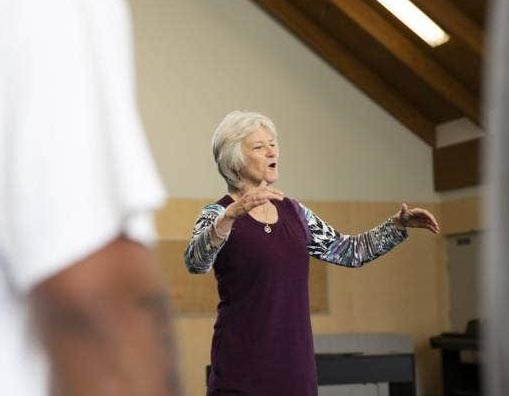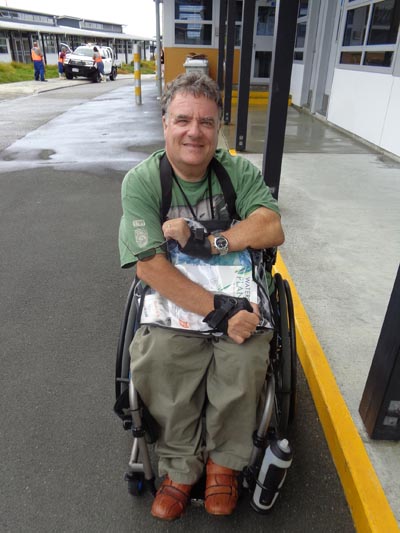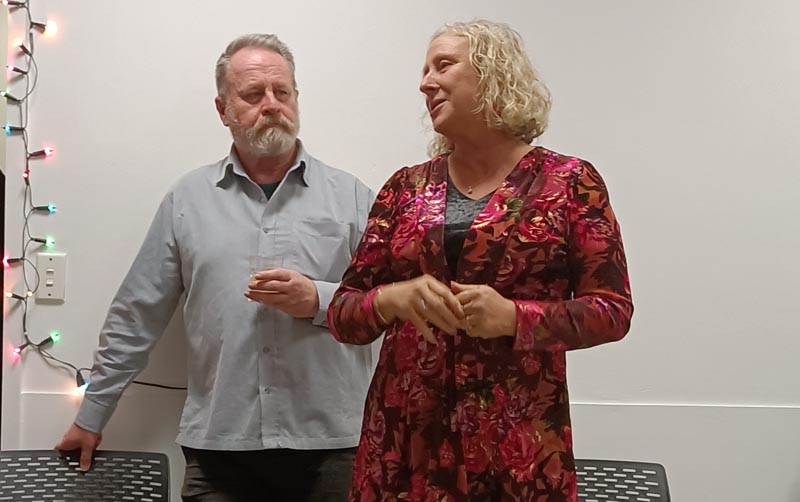“Barbershop singing has taken me out of my comfort zone as I’m not a good singer,” wrote one man participating in a barbershop programme at Spring Hill Corrections Facility. “However, with their patient and persistent teaching styles, I’ve learned singing techniques and am part of a group harmonising system
“This has helped with my self-esteem and confidence and I am very grateful.”
 Spring Hill Corrections Facility in the Waikato region was one of the last of the 18 prisons across Aotearoa to re-open its doors to volunteers after COVID-19 restrictions.
Spring Hill Corrections Facility in the Waikato region was one of the last of the 18 prisons across Aotearoa to re-open its doors to volunteers after COVID-19 restrictions.
One of the first volunteers to return was barbershop group Mighty River Harmony, led by Jill Rodgers with six other members, on 7 August. They’re facilitating a 12-week programme once a week on Mondays with ten participants.
Kelly Tangaroa, its Volunteer Coordinator, says the barbershop group started volunteering at the prison in 2019 but had to stop between 2020 and 2023 because of COVID-19.
Like other Volunteer Coordinators around the country, Kelly kept in touch with her volunteers via emails, online meetings and the occasional event such as a celebration during National Volunteer Week.
“The men will learn a lot of songs and how to harmonise unaccompanied,” she says. “They are also learning things like breathing techniques, how the voice box works, and how to stand and hold themselves when they’re performing.”
 Another volunteer she is looking forward to welcome back is Grant Sharman, a mouth-painting artist who started volunteering at Spring Hill Corrections Facility in 2019.
Another volunteer she is looking forward to welcome back is Grant Sharman, a mouth-painting artist who started volunteering at Spring Hill Corrections Facility in 2019.
“I love the face-to-face contact with our volunteers and seeing how excited the men are when they get to interact with people from the community,” Kelly says. “Some of the men can’t understand why the volunteers want to help them and they are very grateful.”
Volunteer coordinators are responsible for engaging, training, administering and monitoring volunteers, who offer a range of arts and crafts classes, along with life skills, literacy and numeracy, and cultural and religious services.
Statistics from the Department of Corrections’ 2022/2023 financial year show that despite the restrictions, there were 343 volunteers who collectively made 2578 prison visits delivering programmes and services.
In addition, 39 kaiwhakamana (kaumātua and kuia who have access to prisons to support wellness and wellbeing) made 355 visits.
Implementing the Mahi Aroha: Corrections’ Volunteer Strategy
Roslyn Hefford, Principal Advisor, Department of Corrections, is responsible for implementing Mahi Aroha: Corrections’ Volunteer Strategy. The strategy’s aims are to strengthen the induction and training of volunteers, support volunteer coordinators and encourage more people to volunteer.
 “Volunteers are role models and teach valuable skills to prisoners. They also provide an important link to local communities,” Roslyn says. “Bringing people into the prison helps create a sense of normalcy, and encourages better behaviour and pro-social living.
“Volunteers are role models and teach valuable skills to prisoners. They also provide an important link to local communities,” Roslyn says. “Bringing people into the prison helps create a sense of normalcy, and encourages better behaviour and pro-social living.
“The past few years navigating COVID-19 have been difficult but our volunteer coordinators rose to the challenges, learning new ways of working and thinking outside the box to deliver what they could and keep in touch with their volunteers.”
Like Kelly, fellow volunteer coordinators Andrea Zander (Whanganui Prison) and Mary Stretch (Rolleston Prison) welcome the return to near “normal”.
At Whanganui Prison, Andrea is currently managing five courses run by volunteers. Two of these are arts-based: the ukelele and creative writing.
“Arts courses are really valuable and popular with most of the men,” Andrea says. “They learn a range of skills, including communication, and they require a level of self-direction. It’s also important for their mental health and to have a creative outlet to express themselves.”
Creative writing volunteer returns to Whanganui Prison
In May, Andrea welcomed the return of Kate Smith, a volunteer facilitating a creative writing course. Kate’s been volunteering at Whanganui Prison for seven years and is currently facilitating a ten-week course.
“Kate makes a massive difference and as part of her course, the men learn effective communication skills,” Andrea says. “She encourages them to feel comfortable about sharing their thoughts on paper and with the group, knowing there’s no judgement.
“And at the graduation, there’s an expectation that the participants will read a piece of their work in front of the graduation visitors.”
Communicating thoughts and emotions through art
Learning to communicate their thoughts and emotions through art is a key aim of volunteer art therapist Briedi McCrostie’s art therapy course at Rolleston Prison in Christchurch.
Briedi, who is studying for a Master of Creative Arts Therapy (Clinical) at Whitecliffe College, facilitates group work in three units each week and has the clinical supervision of one of the prison’s senior clinical psychologists.
She says the prison’s Volunteer Coordinator Mary Stretch has been “wonderfully supportive” since she took up the role in September 2022.
“Art therapy is not an art class and I’m not an artist. The men are very open to trying new things and we explore traditional artmaking methods, creative writing, meditation, movement, nature-connected art, and more. Each week, we explore different themes and support each other as feelings are expressed and processed.
“I passionately believe that art and creativity help process life experiences, aids healing and supports rehabilitation.”
Visit the Department of Corrections’ website for a list of volunteer co-ordinators, more information about volunteering, how to apply and to offer donations of materials.


